
South Africa is divided into nine provinces. On the eve of the 1994 general election, South Africa's former homelands, also known as Bantustans, were reintegrated, and the four existing provinces were divided into nine. The twelfth, thirteenth and sixteenth amendments to the Constitution of South Africa changed the borders of seven of the provinces.

Gauteng is one of the nine provinces of South Africa. The name in Sotho-Tswana languages means "place of gold".

The Eastern Cape is one of the provinces of South Africa. Its capital is Bisho, but its two largest cities are East London and Port Elizabeth.
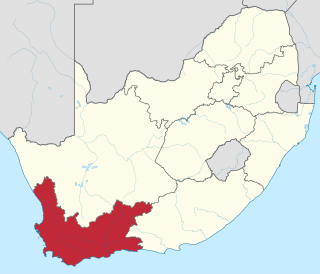
The Western Cape is a province of South Africa, situated on the south-western coast of the country. It is the fourth largest of the nine provinces with an area of 129,449 square kilometres (49,981 sq mi), and the third most populous, with an estimated 7 million inhabitants in 2020. About two-thirds of these inhabitants live in the metropolitan area of Cape Town, which is also the provincial capital. The Western Cape was created in 1994 from part of the former Cape Province. The two largest cities are Cape Town and George.

North West is a province of South Africa. Its capital is Mahikeng. The province is located to the west of the major population centre of Gauteng.
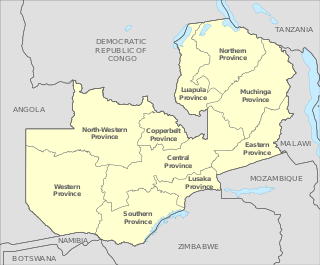
Zambia is divided into 10 provinces for administrative purposes. Each province is headed by a minister appointed by the President and there are ministries of central government for each province. The administrative head of the province is the Permanent Secretary, appointed by the President. There are Deputy Permanent Secretary, heads of government departments and civil servants at the provincial level.
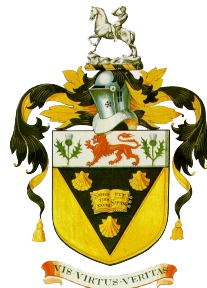
Rhodes University is a public research university located in Makhanda (Grahamstown) in the Eastern Cape Province of South Africa. It is one of four universities in the province. Established in 1904, Rhodes University is the province's oldest university, and it is the sixth oldest South African university in continuous operation, being preceded by the University of the Free State (1904), University of Witwatersrand (1896), University of South Africa (1873) as the University of the Cape of Good Hope, Stellenbosch University (1866) and the University of Cape Town (1829). Rhodes was founded in 1904 as Rhodes University College, named after Cecil Rhodes, through a grant from the Rhodes Trust. It became a constituent college of the University of South Africa in 1918 before becoming an independent university in 1951.

The Republic of South Africa is a parliamentary republic with three-tier system of government and an independent judiciary, operating in a parliamentary system. Legislative authority is held by the Parliament of South Africa.

The University of the Western Cape (UWC) is a public university located in Bellville, a suburb of the City of Cape Town, South Africa. The university was established in 1960 by the South African government as a university for Coloured people only. Other universities near Cape Town are the University of Cape Town,, Cape Peninsula University of Technology (CPUT) and the Stellenbosch University. The establishing of UWC was a direct effect of the Extension of University Education Act, 1959. This law accomplished the segregation of higher education in South Africa. Coloured students were only allowed at a few non-white universities. In this period, other "ethnical" universities, such as the University of Zululand and the University of the North, were founded as well. Since well before the end of apartheid in South Africa in 1994, it has been an integrated and multiracial institution.
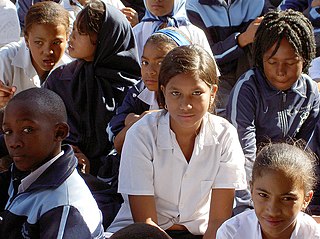
Education in South Africa is governed by two national departments, namely the department of Basic Education (DBE), which is responsible for primary and secondary schools, and the department of Higher Education and Training (DHET), which is responsible for tertiary education and vocational training. Prior to 2009, both departments were represented in a single Department of Education.

Ebrahim Rasool is a South African politician and diplomat who served as the South African Ambassador to the United States from 2010 to 2015, as a Member of the National Assembly from 2009 to 2010, and as the 5th Premier of the Western Cape from 2004 to 2008. He is a member of the African National Congress and has held various leadership positions in the party.

Newfoundland and Labrador has had the same growing pains as other provinces in developing its own form of education and now boasts a very strong, although relatively small, system. The direction of Newfoundland and Labrador's policy has evolved rapidly since the late 1990s, with increased funding, participation rates, accessibility and transferability. Many of the directives the government has been acting upon in the past 10 years have been a result of recommendations that stemmed from a 2005 white paper: Foundation for Success: White Paper on Public Post-Secondary Education. It set the course for furthering the strategic directives of the provincial post-secondary education sector. Some of its recommendations aimed to:
The primary administrative divisions of South Africa are the nine provinces. The provinces are divided into metropolitan and district municipalities, with the district municipalities being further divided into local municipalities. Metropolitan and local municipalities are divided into wards.
The Western Cape Department of Transport and Public Works is a department of the Government of the Western Cape. It is responsible for the development of the transport system in the Western Cape province of South Africa, and for constructing and maintaining buildings and other structures for the other departments of the provincial government.
The Western Cape Department of Health is a department of the Government of the Western Cape, responsible for providing public healthcare to the population of the Western Cape province of South Africa.
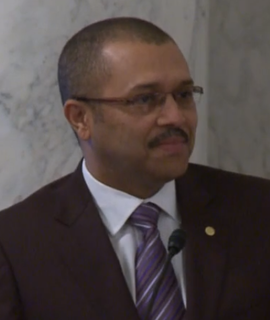
Cedric Thomas Frolick, is the current House Chairperson: Committees, Oversight and ICT in the National Assembly of Parliament for the Republic of South Africa. A teacher, politician, anti-apartheid activist. He retired from teaching in 1999 and subsequently became a politician in the National Assembly. On 18 November 2010, the ANC appointed him as the House Chairperson responsible for Committees, ICT and Oversight.

The National Monuments Council (NMC) was the national heritage conservation authority of South Africa, and therefore also of Namibia, during the major part of the apartheid era. It was the successor body to the Historical Monuments Commission and became known principally for its declaration of several thousand national monuments. It came into being through the promulgation of the National Monuments Act of 1969 and ceased to exist on 31 March 2000 when it was replaced by SAHRA and the provincial heritage resources authorities established in terms of the National Heritage Resources Act of 1999.

Harold Cressy High School is a secondary school in District Six of Cape Town in South Africa. It was founded in January 1951 as the Cape Town Secondary School. The school has played a substantial role in South African history during the apartheid period and the building is identified as an important landmark.

Tafelberg School is an English medium Grade 1–12 public school in Bothasig, Cape Town, South Africa which offers remedial activities for children with special learning needs. The school was located in Sea Point before mid–2010. As of 2014, the school accommodates its full capacity of 400 students.
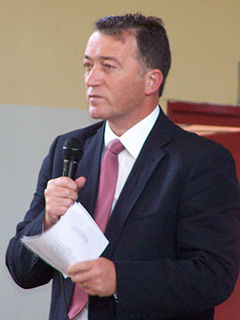
Cameron Muir Dugmore is a South African politician who is the Leader of the Opposition in the Western Cape Provincial Parliament. A member of the African National Congress, he has been serving as a Member of the Western Cape Provincial Parliament since 2014. He previously served in the provincial parliament from 1994 to 2009. He served as the Western Cape Provincial Minister of Cultural Affairs and Sport from 2008 to 2009, and as the Western Cape Provincial Minister of Education from 2004 to 2008.


















